- Home
- Fay Weldon
The Heart of the Country Page 10
The Heart of the Country Read online
Page 10
But listen, enough about Natalie, Angus is at last talking. Nothing will stop him. He looks at her shyly from time to time. He feels awkward in his body: his tie is askew. He has been up to say goodnight to Natalie’s children, to boom at them with an unfamiliar but reassuring male voice. The children’s bedrooms are not right next door to Natalie’s bedroom: there is a bathroom in between. He is glad of that. He hopes her kids sleep soundly. He realizes his mind is leaping ahead too far and too fast; but then again, nothing ventured, nothing won. And Angus is in a position of power. Even so, he feels tentative and helpful and is surprised at himself.
‘Do you have any candles?’ he’s saying. ‘I like dinner by candlelight. Jean doesn’t see any sense in it. She’s a practical woman. No softness. You’re not a practical woman, Natalie, or you wouldn’t be in this fix now. The house not even in joint ownership! It was bound to happen. Down comes Inland Revenue, up go the For Sale notices and before you know if your house is sold to the first bidder. Not the best but the first and if word gets round it can go for as little as half market value. Inland Revenue don’t care, so long as they get their whack, why should they? There’ll be nothing left over for you, if you’re not careful. But don’t worry, I won’t let it happen. I have quite a lot of pull round here. I’m ever so fond of you, Natalie.’
She stares at him with her full blue eyes. He doesn’t know what she’s thinking. He wishes they could forget supper and go straight to bed.
‘What happened between you and Arthur?’ He wants to know, and he thinks it would be good to remind her she’s not so virtuous as she makes out. Again she doesn’t reply. ‘Don’t bother,’ he says. ‘I can imagine. Worried husbands aren’t much cop in bed. Me, I never worry.’ He laughs lightly, to show it’s true. ‘Harry was a bit of a cold fish, wasn’t he. Did he wear his steel-rimmed glasses in bed? Why did you marry him? What got into you? Someone as gorgeous as you? What did you talk about in the evenings? Or did he just watch telly? Anyway, you found a bit of light relief in Arthur. I don’t blame you. Except Arthur! – Well, there you go again. A bit of a poseur, really, Arthur. An eye to the main chance, sexually. Not serious. I’m serious, Natalie.’
He finds he is. He doesn’t want to go to bed with her now. He’s frightened. He wants her to love him, and want him, and when he’s sure of that only then he’ll go to bed with her.
‘Warmth,’ he says, out of the blue. ‘A man can’t live without…’ He isn’t sure what it is a man can’t live without, except all the things he’d had to: he lives with a woman set up in antagonism against him; the best he can do with her is a kind of animated, sometimes even exhilarating, armed truce – but what he wants is gentleness, enclosure, love – who doesn’t?
‘Take me seriously, Natalie,’ is all he can say.
And Natalie responded to Angus with what she described later, ashamedly, as a splurge of self-pity.
‘You called me Natalie,’ she said. ‘You called me by my name. There’s no one to do that anymore. I don’t seem to have friends. There are people who call me Mrs Harris and either blame me for what Harry did, because wives are always held responsible, or blame me because somehow or other I must have driven him away, and the children call me Mum, and now I come to think of it Harry most often called me “you”. Miss Eddon Gurney’s name is Marion. I expect he’s with her now. I expect he says her name all the time. What would the time be in Marbella? They’re probably making love this very minute. Though why should I think they’d wait for night? If people really fancy each other, night or day should make no difference, they’d be at it all the time. Harry and I only ever made love in bed. Never once out of it. Some people use the bath, don’t they, or sofas, or fields, or floors.’
‘When they’re young,’ he said, cautiously, thinking of his back. What was she suggesting? But she fell silent, and wouldn’t meet his eye. He moved in to take the benefit of the moment and put his arm round her but she stepped away.
‘You’re taking advantage of me,’ she said. Well, what did she expect? Of course he was, in a way.
‘I’m trying to help you,’ he said. Of course he said it.
‘You’re not helping,’ she said. ‘How can I explain to you how my body feels? That if anyone touches it, anyone gives it a feeling that will upset it, it will simply collapse and die and me with it. You don’t care about that: you just care about you. You’ll help me out, you say. You’ll get a good price for this house. You mean if I go to bed with you you will. Otherwise not.’
‘I didn’t mean it like that.’ Well, he half had, half hadn’t.
‘I don’t care what happens to the house,’ she said. ‘What happens to me and the children?’
‘Same thing,’ he said. ‘Money is what matters.’
‘My body matters,’ she said, savagely. ‘Harry used it and threw it away, and Arthur entertained himself okay with it, just for the time being – ’
‘You were doing the same thing, weren’t you?’
‘Then I was wrong,’ she said severely, reminding him horribly of his wife. ‘I want my body for myself, thank you, for the time being.’ And Natalie shut her mouth tight; clamp, clamp, in the mood of one fixing a chastity belt upon herself, iron and unforgiving though it might be. In Natalie’s situation, I can tell you, I’d have been in bed with Angus like a shot, and forget his paunch and his maunderings, but not Natalie. Well, some women are like that. Irrational and unrealistic. Fussy, in a word.
‘Quite wrong,’ Natalie opened her mouth sufficiently to say, before snapping it shut again, and Angus felt defeated, and fat, and unwanted and went home to Jean without his supper. Jean had a period, or so she said. No doubt she had pills to bring one on whenever she felt inclined, which was mostly. He was the more aggrieved because he had felt and offered love.
Arthur lay in bed that night with his wife Jane and thought she was a dear, good creature, and he should behave better to her. She had never, even in her younger days, given him cause for jealousy, and so he scarcely understood the emotion himself, but understood it must be painful and obsessive, or why else was she so thin and jumpy? It was a mistake for her to live above the shop: she should be further away from the back room. Then her mind could be more at peace, and she would not feel obliged to go searching for stray hairpins and long (or worse, short and curly) hairs, which she would then put under a child’s microscope in order to identify, by colour. But of course, these days, so many people’s hair was multi-coloured.
‘Tell you what, Jane,’ he said, ‘let’s rent out the flat and buy something outside Eddon Gurney.’
‘Something with level floors,’ she said, ‘so I can wear heels.’
‘Something new?’ he said, shocked. Then he said, generously, ‘But if it’s what you want.’
‘There’s so little on the market,’ she said. And there was. House prices rose and rose. Now the trains from Castle Carey and Bath were so much improved, the rich were moving further out of the London suburbs and commuting in to work. It was becoming more and more like Surrey, Arthur complained. But now was obviously the time to buy; just before the property boom was properly underway.
‘I’ll look out for something,’ he said. ‘I expect I’ll hate it but if it’s what you want, that’s the main thing.’
He would like her to be happy, so long as her happiness didn’t stand between him and his.
Doing it all Wrong
In the middle of March, Ben and Alice started at the comprehensive. That is to say, Ben stood in the playground on the morning of the first day and shouted at his mother, ‘I won’t go to this school. I won’t. I’m not like the others. They’re thicks and turnip tops. They’ll laugh at me. I hate you! What have you done with my father? You are a bitch!’
Then he gave up, and went inside, unprotected by a school uniform (for here they wore any old thing – one of his other complaints), looking much like anyone else aged 12. Presently Alice stopped crying and went inside the school too, to whatever unpleasant destiny she belie
ved awaited her. Natalie found herself saying under her breath, ‘I hate you, Harry Harris’ and meaning it.
Hate is the third stage of the cure. After passivity comes anger, after anger comes hate. These allegedly negative emotions are to my mind fine, healing things. Natalie was fortunate enough to heal quickly. People differ in the speed with which they recover from what therapists refer to as major life disasters (divorce, that is to say) in the same way as they do from cuts and bruises, and she was lucky. She had been born with a very strong life-energy (Tor-language – sorry) which during her marriage to Harry had simply stayed tamped down, underground. It was this, I do believe, which made her so attractive to men (oh and women, women too!) at that particular time: the sense of the unreleased, which they (Eros willing) might be the lucky one to release. Her suitors interpreted it as simple sexual attraction, but it was more all-pervasive than that. Oh yes.
Dunbarton was withdrawn from auction, suddenly, at the end of March, and was sold, privately, for sixty thousand pounds.
‘He offered cash,’ explained the pleasant, bright-eyed young man at Waley and Rightly, the estate agents. He was Angus’ assistant. ‘We can’t afford to let a cash buyer slip through our fingers! Not with Inland Revenue tapping on the window pane! Not to mention the bank!’
Natalie could remain in the house for two more weeks, he said. The contents were to be auctioned separately at the end of that time, and should, he consoled her, fetch an excellent price. Angus was to be the auctioneer.
‘A fine man!’ said Bright Eyes. ‘Splendid auctioneer.’
Natalie went down to the Welfare Office, and this time saw not Mary Alice but a certain Rosemary Tuckard. Rosemary had a flat, round face and very tiny features, so her face seemed almost blank. Talking to her was rather like talking to one of Alice’s cut-out paper dolls, Natalie thought. But at least she smiled and nodded, and a cold dark hole did not seem to be her natural home.
‘Inland Revenue forced the sale,’ said Natalie. ‘I didn’t have a leg to stand on, according to my solicitor. Not that I trust him. One of his friends bought it, as it happens. You know him? Arthur Wandle the antique dealer? His wife was tired of living above the shop.’
‘It’s easy to be paranoic at a time like this, Mrs Harris,’ said Rosemary Tuckard. ‘That’s a very serious allegation you’re making and I don’t think you should repeat it.’
‘If I’m paranoic,’ said Natalie, ‘will I get more housing points?’
She was getting quite sassy with those in authority. It did her no good.
‘I wonder if you’re being quite open with us about your circumstances?’ asked Ms Tuckard. ‘A lot of people do withhold information, thinking perhaps it isn’t relevant, when it is. If, for example, you are in receipt of any financial help from a man or are even living with one…’
– ‘I’ve declared everything and I’m living with no one’ –
‘Then what are you living on?’ enquired Ms Authority, ‘if, as you say, you have no source of income since your husband left?’
‘On the children’s money boxes.’
‘Um. I believe you did have an association before your husband left?’
Now how could she know a thing like that? Easy. She was a good friend of Jean the pharmacist. Who wasn’t?
‘Are you implying it’s my fault my husband left?’ demanded Natalie. She was bright pink and angry. ‘Is that what you mean… ?’
‘Well,’ said Ms Tuckard, who had never been unfaithful because the opportunity had never arisen. ‘You can’t mess up your life wilfully and then expect the State to step in and pick up the pieces!’
‘What sort of world is this?’ demanded Natalie, flailing away. ‘Do I have no privacy at all?’
‘It’s a world in which you are asking for public funds,’ said Ms Tuckard, primly, ‘and your character and behaviour when in receipt of them must be taken into account.’
‘But what you’re talking about was before I was in receipt of them.’
‘Of course,’ the flat-faced woman now apparently in charge of Natalie’s life and conduct observed, ‘and therefore doesn’t affect your legal rights: not at all. Nevertheless, we do have areas of discretion. I take it the sale of the contents is expected to bring in quite a sum?’ No doubt she too was a friend of Bright Eyes.
But, as Natalie explained, much of that was already bespoken. The school fees had to be paid, and all the local creditors. It was a matter of pride, as much as legal necessity.
‘Pride,’ observed Ms Tuckard. ‘You may have to learn to forgo that.’
‘And after that I’m homeless,’ said Natalie. ‘That’s why I’m here. Not to talk about my love life.’
‘You want the children put in care? Is that it?’
‘Of course not!’
‘It might be best for them until you’re sorted out.’
‘I don’t want to be sorted out, I want a house to live in.’
She was doing it all wrong, of course. I told her so later.
‘You mustn’t talk about wanting this or that,’ I said to her, ‘about your feelings or pride or whatever: you must talk about your rights as a citizen half the time and cry the other half. That gratifies them both ways – as officers of the State and virtuous private citizens to boot.’ But too late then, of course.
‘A house is out of the question,’ said Ms Tuckard. ‘We just don’t have houses available. I wish we did. Our public housing stock is being run down. We are obliged by law to sell them to tenants if they wish to buy, and round here they often do. The re-sale price can be really quite good, you see, what with the views and the scenery and people wanting second homes, weekend cottages. There is, of course, emergency accommodation. We don’t like women and children of otherwise good character sleeping in ditches! So we do have a hostel. You have to be out by nine in the mornings, of course, and not back until seven. It can be tricky, especially if it’s raining, but better than nothing.’
‘I suppose I could join the peace convoy,’ said Natalie. ‘At least they wouldn’t turn me out in the rain.’
‘I wouldn’t advise it,’ said Ms Tuckard, suddenly brutal. ‘They have some very nasty diseases up there. In fact, if you try anything like that we’ll take the children into care at once.’ And that put Natalie in her place.
At periodic intervals the peace convoy – for so it calls itself – trundles into Glastonbury: a procession of ancient vans and lorries which journey at an average speed of three miles an hour, wherein the peace hippies live, in what the good citizenry see as squalor, depression and aggressive criminality, and the travellers themselves see as pleasant, dozy virtue, and the only possible way to live – semi-nomadic, looking always for a home, a place where welcome awaits, and taps and hot water, and never finding it. Moving on, moved on, the new gypsies. Well, to journey is better than to arrive – or so say those who have already arrived! The peace travellers shake their dreadlocks on the local streets as they gather before the local DHSS offices, and wait to collect their rights, their payment from the State. To the ratepayers, to those with painted front doors, it seems that AIDS, herpes and hepatitis fly in a mist about them as they wait. Shop doors slam and pubs close as they pass. Some have noses eaten away by cocaine and syphilis, some are whole, clean and beautiful and most consult the stars for advice. They have their spokesmen (sorry, spokespersons) and their martyrs. Policemen offer them petrol to take them off to the next county. Vigilantes slash their tyres to show them what is what. Otherwise, nobody knows what to do about them. For what is what? How can they be sent back home when they have no homes to go to? How can they take jobs when they don’t have the mentality to do jobs? How can those who ought to be in the loonybin go there even, since they’re closing down all over the country, and not just in the heart of it? How can those who should be in prison go to those, since the prisons are already packed to bursting with those who consent to society’s reproach, and these do not? You can hold one person against (allegedly) his will, but a hun
dred thousand? The peace convoy is the first tattered, fluttering swallow of a long hard summer ahead, in which the travelling dispossessed roam the countryside, living off what they can.
Natalie would never join them. She would be too frightened. I toyed with the idea once. But to be outside the law did not suit me. And I’m sorry to say I was swayed by the Argument from Hygiene. I wanted to be clean, I wanted not to smell, and I wanted that for my children too. That was the real madness. For of course you can’t get away from dirt, ever. There’s a kind of grime about mental hospitals: a lingering septic smell, like the children’s breath when they have tonsillitis. Patients are still put to washing floors, but nobody teaches them how to do it. Washing floors is a skilled job. Most people (like Flora) do it by swilling water around the middle, without sweeping properly first, so that mud lines the skirting of the floor, up and into the spaces between cupboards and furniture. And if you walk down any corridor in a mental hospital you will observe the inch of black grime which proves me right.
Washing Away the Stains
Arthur came to see Natalie on the day the contents of the house were sold around her. She sat in the children’s empty playroom. Porters had taken the contents away, and set them up in lots downstairs, under ‘Toys – assorted’. Natalie did not mind seeing them go. She hated Ben’s Zoids and Action Men and robots and computer games: they were soulless and nasty. They were training her son in murder. She hated Alice’s Care Bears and Cindy Dolls and Little Ponies. They were training her daughter in silliness and sentimentality. They could all go. Natalie could have stopped them, and said to the porters, ‘No, are you mad? Toys are personal! Not part of the sale.’ But what would she have done with them then? She had two big suitcases already filled to the point of not closing. She could take with her, wherever she was going, what she could carry and no more, one suitcase in each hand, like a refugee. Who knew when she would ever again have a shelf for a toaster or a board for an iron, let alone a cupboard for toys! Let it all go, and she would take the money, and start again! She wanted nothing of the past, anyway. The past was all full up with Harry Harris, whom she hated.

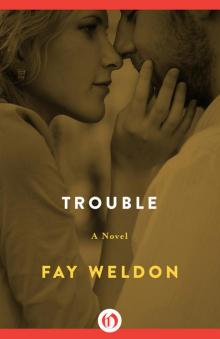 Trouble
Trouble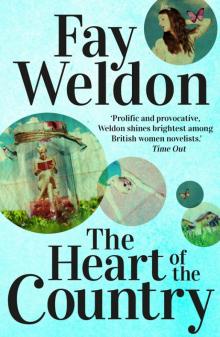 The Heart of the Country
The Heart of the Country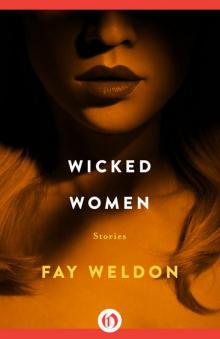 Wicked Women
Wicked Women Mischief
Mischief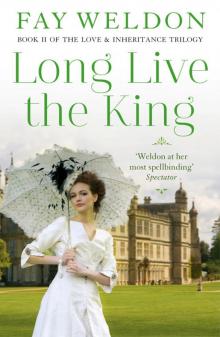 Long Live the King
Long Live the King Remember Me
Remember Me Worst Fears
Worst Fears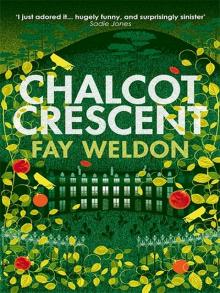 Chalcot Crescent
Chalcot Crescent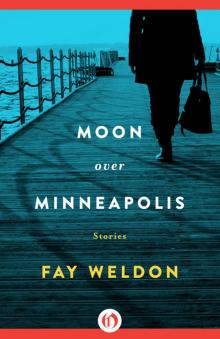 Moon Over Minneapolis
Moon Over Minneapolis The New Countess
The New Countess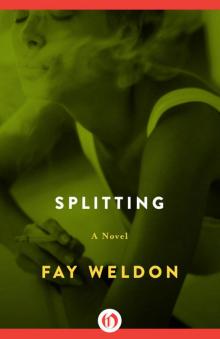 Splitting
Splitting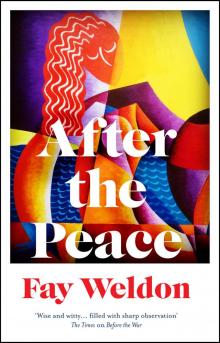 After the Peace
After the Peace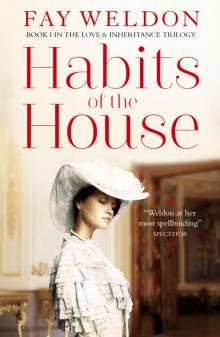 Habits of the House
Habits of the House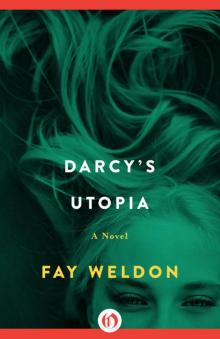 Darcy's Utopia
Darcy's Utopia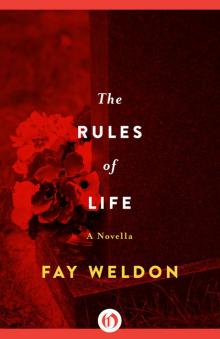 The Rules of Life
The Rules of Life Kehua!
Kehua! Before the War
Before the War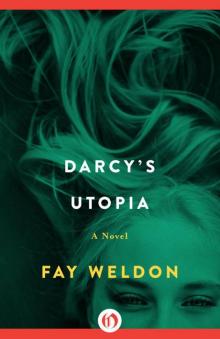 Darcy's Utopia: A Novel
Darcy's Utopia: A Novel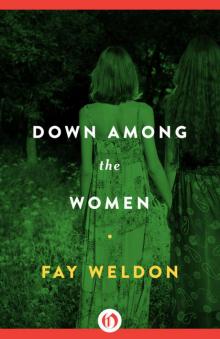 Down Among the Women
Down Among the Women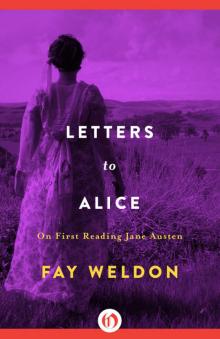 Letters to Alice
Letters to Alice 3 Great Historical Novels
3 Great Historical Novels Female Friends
Female Friends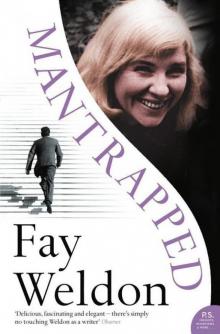 Mantrapped
Mantrapped The Bulgari Connection
The Bulgari Connection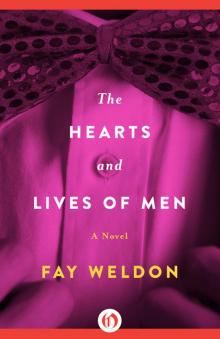 The Hearts and Lives of Men
The Hearts and Lives of Men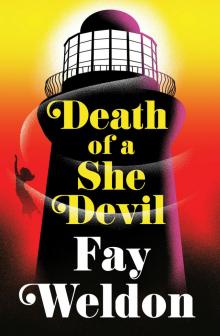 Death of a She Devil
Death of a She Devil